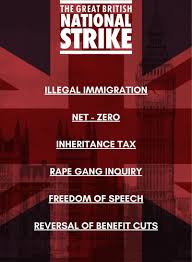Understanding the Great British National Strike 2023

Introduction
The Great British National Strike in 2023 marks a significant moment in the history of labour movements in the United Kingdom. Prompted by rising living costs, inflation, and dissatisfaction with working conditions across various sectors, this collective action unites millions of workers in a demand for better pay and conditions. The strike highlights ongoing struggles for workers’ rights and amplified calls for government intervention in labour disputes, making it a pivotal event in contemporary British society.
Background
The strike has its roots in widespread discontent that has been brewing for several years, exacerbated by economic uncertainty and the fallout from the COVID-19 pandemic. Many workers, particularly in the public sector, have faced stagnant wages while inflation rates have soared, leading to a decline in real income. Essential services, including public transport, healthcare, and education, have witnessed significant participation, showcasing the unity among various labour groups.
Key Events
The Great British National Strike commenced on March 1, 2023, with an estimated 1.5 million workers taking part across the UK. This includes teachers, nurses, rail workers, and civil servants. Union leaders have played a critical role in mobilising their members, emphasising solidarity and the importance of collective bargaining. Notably, demonstrations were held in major cities such as London, Manchester, and Birmingham, attracting thousands of supporters who rallied for workers’ rights.
In the lead-up to the strike, a series of negotiations and efforts for dialogue with the government were attempted but largely unsuccessful, prompting unions to resort to this unprecedented action. Feedback from government officials has varied, with calls for negotiations being reiterated from both sides, yet union leaders express disillusionment regarding the willingness to address their concerns adequately.
Conclusion
The significance of the Great British National Strike extends beyond immediate demands for pay increases. It reflects deeper societal issues related to economic inequality and workforce treatment in the UK. As the situation develops, predictions suggest that this movement could lead to long-term changes in labour laws and policies, drawing attention to the need for sustainable and equitable solutions for workers.
The outcomes of the strike may set a precedent for future negotiations and workers’ rights actions, influencing national discourse around labour conditions. For citizens, understanding the implications of this historical strike is crucial, as it may redefine the relationship between the government and the workforce in the coming years.









